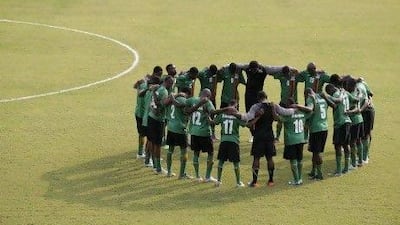They are in their late 20s or early 30s now, those Gabonese people who remember the schoolyard song. As girls and boys, they would chant it mischievously, a rhyme reflecting the climate of suspicion and confusion that surrounded the tragic events of April 1993.
"Watch out, watch out," went the words, sung in French, "Papa Omar got the Zambian team, and if you don't watch out, he's gonna get you too."
In Zambia, the same generation of children would grow up with a far clearer idea of where Gabon, a country then ruled by the long-serving Omar Bongo - "Papa Bongo" - many miles away, than their parents ever had; and they developed a clear notion of what it stood for.
For a period in the 1990s, "Gabon" became a derogatory adjective in Zambian conversation: a slow pupil in school was "bit a Gabon", a malfunctioning piece of machinery had "gone Gabon".
A single event and its ugly aftermath caused all this.
It would put serious political strain on the relationship between two countries, who, should Zambia win their African Cup of Nations semi-final against Ghana in Equatorial Guinea today, will tread sensitively around the fact Zambia's players would then be travelling in Libreville, the capital of Gabon, for Sunday's final of a competition their country last stood as good a chance of winning back in the early 1990s.
Zambian football has spent nearly 20 years trying to get over one of the worst sporting disasters of the last two decades, the air crash that killed 30 passengers, most of them Zambian players, just off the Libreville coast. On that fateful night, April 27, 1993, Zambia's footballers had landed at Libreville airport en route to Senegal, where they were to play in a World Cup qualifier.
It was a refuelling stop on a long, uncomfortable journey in a De Havilland C5 Buffalo military aircraft which had already become a source of dread after some fraught trips across Africa during the preceding months. But they stoically accepted that financial constraints on the Zambian Football Association (FAZ) meant passenger planes were impossible to charter.
There were problems anticipated on this expedition, too. Central Africa was politically twitchy at the time and they had been refused permission to cross Congolese airspace for security reasons. The plane made it to Libreville and refuelled.
According to the Gabonese Ministry of Transport, the aircraft then underwent routine checks and took off normally.
It was in the air for about two minutes when an explosion lit up the sky. By the end of the next day, 24 bodies had been pulled from the sea (with six more missing). There were no survivors.
The mourning would be long. Investigations, in the absence of a black box flight recorder, stretched over years, and strained diplomatic relations.
Rumours claimed the Buffalo had been hit by a Gabonese army missile, on suspicion it was part of an attempted coup against the regime of Omar Bongo. Some Zambians demanded political reprisals against Gabon.
The Zambian minister of foreign affairs asked the Organisation of African Unity to step in and push the Gabonese authorities to stop "throwing roadblocks at every turn of the investigations". Pilot error and faulty equipment were eventually blamed.
In the meantime, a remarkable sporting phoenix was rising. A new Zambian squad, based around the overseas-based players who had not been on the Buffalo and young men lucky enough not to have yet been promoted to the senior side, continued to fulfil fixtures and, less than a year after the crash, actually reached the 1994 African Cup of Nations.
They narrowly lost to Nigeria in the final, while bitterly complaining about the Gabonese referee.
That brave team had been captained by Kalusha Bwalya, who played at the time for PSV Eindhoven and had made, ahead of April 27, 1993, separate arrangements to travel direct from Holland to Senegal. He never forgets how lucky he was.
He then made it his mission to raise Zambia again to the pre-eminence they had promised before his colleagues perished. Bwalya led the side for a further decade, then coached them, then became the FAZ president.
"People will always wonder what might have been," Bwalya said. "We had a team with such confidence."
Remarkably, the rebuilt squad maintained some of that confidence for another two years. After the final in 1994 came a bronze medal in 1996. But gradually Zambia slipped back into what had been their place in the African hierarchy for most of their history: among the top 16, occasionally better, sometimes worse.
"I always hope," Bwalya said, "that one day we can get to a level we can compare with what those boys did."
This Zambia team, a generation on, stand potentially 90 minutes away from that, to making a resonant date with history.
Reaching the final would not bring back the 30 dead, but it would honour them poignantly on Sunday, in the Omar Bongo stadium, Libreville, Gabon.


